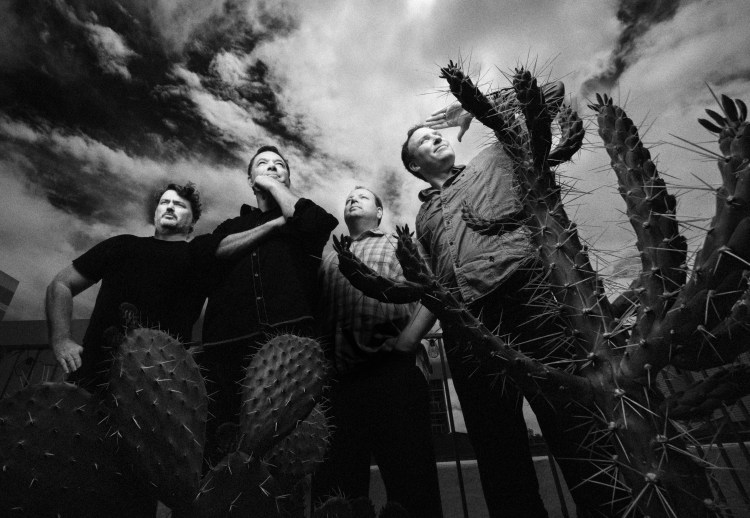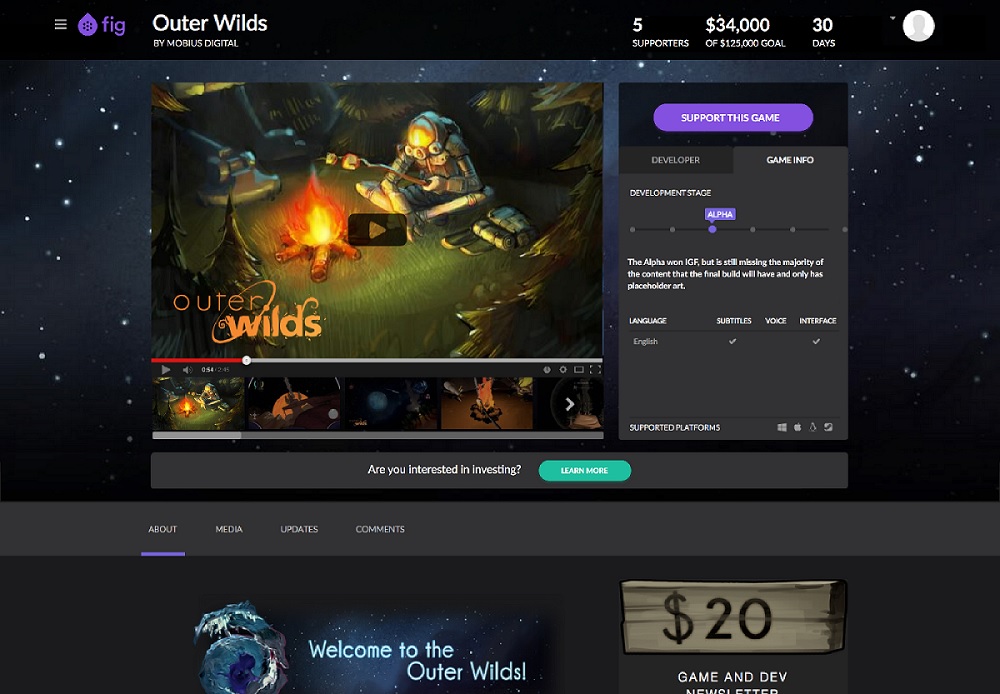Kickstarter might not be the best place for developers to crowdfund their games anymore.
Justin Bailey has launched Fig, a new crowdfunding site built specifically for games. The former chief operating officer of developer Double Fine partnered with some big names and studios who previously had success on Kickstarter, specifically his old colleague, Tim Schafer (The Broken Age), Brian Fargo of InXile (Wasteland 2), and Feargus Urquhart of Obsidian (Pillars of Eternity). Each has pledged to launch campaigns for new games on Fig.
Fig also stands out from other crowdfunding sites in that you buy equity in a game or developer, meaning you can actually make money from a successful project.
GamesBeat talked with Bailey and Urquhart about Fig and how it’ll benefit developers and backers.
GamesBeat: How is what you’re doing different from Kickstarter?
Justin Bailey: There’s a few differences. We’re curated. We’re specific to games. We’re a vertical approach, so our involvement doesn’t just stop once the campaign is done. A lot of the stuff we have is value-add stuff. Things like continued mentoring that’s going on. But when the game launches we’re going to help promote it to make sure it sells more. It’s a vertical approach to crowdfunding. One of the big things we’re doing is combining an investment network with it. We have queued up unaccredited investment for later this year.
Feargus Urquhart: The other way I look at it is, with Tim [Schafer] and Brian [Fargo] and I, our big thing is, how do we not just get our games funded, but get other people who want to make great games funded? Not just within the crowdfunding space — when Justin came and talked to us about the equity side of things, we thought that could change things so much from the standpoint of what we could get funded and how we could get funded.
On top of that was the platform that Justin and the guys have been putting together. It takes all this stuff we’ve been doing on Kickstarter and makes it a part of the system. Instead of add-ons and stretch goals and all these things being this very ad hoc thing we have to do, it really makes it so that we can run our campaigns in a way that’s the way video game campaigns have been run on the different crowdfunding sites.
GamesBeat: Does this mean that the companies involved. Will Obsidian, InXile, and Double Fine not use Kickstarter in the future?
Urquhart: For our next games, absolutely [we won’t use Kickstarter]. But to be clear, we just worked with another company to do a board game. We did the Pillars of Eternity card game. That would still be something we’d use other crowdfunding sites to do, just because it’s not what we do, but it’s connected. I don’t want to say we would never do anything affiliated with any of the other crowdfunding outlets. But for games, this is why we’re getting together to do this together. And I’ll say together once more.
Bailey: We’re not for board games or anything like that now. We’re specifically for video games. That’s our concentration.
GamesBeat: For someone who’s used to the traditional Kickstarter investment or preorder system, how would you explain the difference in this equity funding?
Urquhart: One of the important things is that this is both. Each project is going to be different. Some projects may choose not to do any of the equity investment. They would only do traditional crowdfunding. It gives that flexibility to do both. It keeps them pretty separate. Everyone understands what part is crowdfunding and what part is investment funding.
Bailey: Other crowdfunding sites are horizontal. They serve many industries. Anything you do has to work for taxidermy just as much as it works for video games. If you look at a lot of crowdfunding, it’s about building a finished product. The campaign goal is set at the minimum amount of orders needed to make that product. Games are completely different. The people involved are financing the development of that game. It’s much more specific. A lot of times, with these high-profile games like Feargus and Brian and Tim make, the stakes are high. Multiple millions are coming in.
That denotes there being more of an active involvement. Having a support network like we’ve set up here, where you have access to people who’ve done it before, is something that’s needed, instead of just having this tool that people use, which is completely agnostic. It’s not tailored for games. It has no knowledge of games.
Urquhart: To answer the why of it, it’s not just about how to be different from an Indiegogo or Kickstarter or things like that. It’s about having things keep on moving forward from 2012, when there was that huge boom in crowdfunding for video games. That changed our company immeasurably. We have our own brand now. We get to make Eternity games now, so long as we make good ones. That’s awesome. Allowing game-makers to have that opportunity is great.
Now, the difference is, what can we do from there? That’s what Fig does. That’s the connection. It’s not just crowdfunding. If we want to make bigger stuff, if we want to involve people even more in what we’re doing, this takes crowdfunding to a point where people can fund $50,000 games, or $2 million games, or $5 million games. Hopefully we can even get to $10 million and $15 million games. That’s great for the independent game development scene, allowing that. That’s what the difference is. It’s about why we want to do it.
Bailey: We can take the community that’s getting involved, that helps make this possible, and they have the opportunity to get involved and enjoy some of the financial success that these titles enjoy. They can participate financially. That’s really big. If you look at who’s backing us, like our lead investor Spark, they were also the lead investor for Oculus. A lot of people involved in that on the crowdfunding campaign — it almost looks like they got cut out of what they got from Facebook. Here we have a chance to remedy that.
Furthermore, if you look back three years, you’ll see that games have been responsible for evolving crowdfunding. Tim and Brian and Feargus have taken an active role in helping do that. You have terms like slacker backers, concepts like stretch goals, these were pioneered. Now you have investment crowdfunding. We want to take a leading role in that as well.



